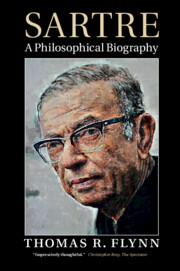Book contents
- Frontmatter
- Dedication
- Contents
- Preface
- Acknowledgments
- Abbreviations
- 1 The childhood of a genius
- 2 An elite education: student, author, soldier, teacher
- 3 Teaching in the lycée, 1931–1939
- 4 First triumph: The Imagination
- 5 Consciousness as imagination
- 6 The necessity of contingency: Nausea
- 7 The war years, 1939–1944
- 8 Bad faith in human life: Being and Nothingness
- 9 Existentialism: the fruit of liberation
- 10 Ends and means: existential ethics
- 11 Means and ends: political existentialism
- 12 A theory of history: Search for a Method
- 13 Individuals and groups: Critique of Dialectical Reason
- 14 A second ethics?
- 15 Existential biography: Flaubert and others
- Conclusion: the Sartrean imaginary, chastened but indomitable
- Select bibliography
- Index
- References
10 - Ends and means: existential ethics
Published online by Cambridge University Press: 18 December 2014
- Frontmatter
- Dedication
- Contents
- Preface
- Acknowledgments
- Abbreviations
- 1 The childhood of a genius
- 2 An elite education: student, author, soldier, teacher
- 3 Teaching in the lycée, 1931–1939
- 4 First triumph: The Imagination
- 5 Consciousness as imagination
- 6 The necessity of contingency: Nausea
- 7 The war years, 1939–1944
- 8 Bad faith in human life: Being and Nothingness
- 9 Existentialism: the fruit of liberation
- 10 Ends and means: existential ethics
- 11 Means and ends: political existentialism
- 12 A theory of history: Search for a Method
- 13 Individuals and groups: Critique of Dialectical Reason
- 14 A second ethics?
- 15 Existential biography: Flaubert and others
- Conclusion: the Sartrean imaginary, chastened but indomitable
- Select bibliography
- Index
- References
Summary
On November 1, 1946, Sartre delivered a lecture entitled “The Writer’s Responsibility” for the inaugural general conference of UNESCO at the Sorbonne. In view of the auspicious nature of this founding symposium, he concludes with a litany of recommendations that he believes should guide the writer in our day:
To create a positive theory of liberation and freedom;
To put himself in a position to condemn violence from the viewpoint of oppressed men and classes;
To establish a true relationship of ends and means;
To immediately reject, in his own name – which, of course, will not prevent it – any violent means of establishing a regime;
Finally, to devote his thoughts without respite, day in, day out, to the problem of the end and the means; or, alternatively, the problem of the relation between ethics and politics.
Underscoring the timeliness of these remarks, he adds: “That is the problem … of the present age, and it is our problem, it belongs to us writers. That is our responsibility, not eternal but contemporary.”
- Type
- Chapter
- Information
- SartreA Philosophical Biography, pp. 262 - 282Publisher: Cambridge University PressPrint publication year: 2014



